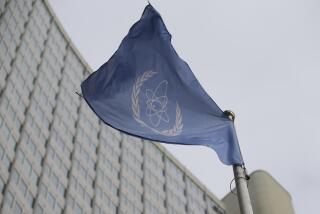Iran: U.S. Nuclear Fears Overblown
More than 18 months of intrusive inspections by the International Atomic Energy Agency in Iran failed to produce a smoking gun. In fact, the report released in September by the IAEA confirmed the organization’s original finding from November 2003 that “to date there is no evidence that the previously undeclared nuclear material and activities ... were related to a nuclear weapons program.”
But what good did that do Iran? While the IAEA was making “steady progress” in understanding the Iranian program and resolving the outstanding issues, the United States mobilized its substantial power and influence on the IAEA board of governors, which may very well push us all to an unwanted confrontation of uncontrollable magnitude that will benefit no country, group or cause, save for few extremists on all sides.
American officials apparently believe that Iran’s declared peaceful nuclear program is just a cover for developing atomic weapons. But this is based on two erroneous assumptions, which have been repeated often enough to become conventional wisdom.
The first is that Iran has vast oil and gas resources and therefore does not need nuclear energy. Although it is true that Iran is rich in oil and gas, these resources are finite and, given the pace of Iran’s economic development, they will be depleted within two to five decades. Further, it is much more economically advantageous for Iran to export these resources than to burn them; they are the major source of our hard currency.
Thus diversification -- including the development of nuclear energy -- is the only sound and responsible strategy for Iran.
Even the State Department was convinced of this in 1978 when it stated in a memo that the U.S. was encouraged by Iran’s efforts to expand its non-oil energy base and was hopeful that the U.S.-Iran Nuclear Energy Agreement would be concluded soon and that U.S. companies would be able to play a role in Iran’s nuclear energy projects.
The second assumption is that because Iran is surrounded by nuclear weapons in all directions -- the U.S., Russia, Pakistan and Israel -- any sound Iranian strategists must be seeking to develop a nuclear deterrent capability for Iran as well.
It is true that Iran has neighbors with abundant nuclear weapons, but this does not mean that Iran must follow suit. In fact, the predominant view among Iranian decision-makers is that possession or pursuit of nuclear weapons would only undermine Iranian security. Viable security for Iran can be attained only through inclusion and regional and global engagement.
Iran today is the strongest country in its immediate neighborhood. It does not need nuclear weapons to protect its regional interests. In fact, to augment Iranian influence in the region, it has been necessary for Iran to win the confidence of its neighbors, who have historically been concerned with size and power disparities.
More globally, Iran, with its current state of technological development and military capability, cannot reasonably rely on nuclear deterrence against its adversaries in the international arena or in the wider region of the Middle East.
There are also serious ideological restrictions against weapons of mass destruction, including a religious decree issued by Ayatollah Ali Khamenei, the leader of the Islamic Republic of Iran, prohibiting the development and use of nuclear weapons. Moreover, such an unrealistic option would be prohibitively expensive, draining the limited economic resources of the country.
In sum, a costly nuclear-weapon option would reduce Iran’s regional influence and increase its global vulnerabilities without providing any credible deterrence.
At the same time, Iran has a right under the Nuclear Non-Proliferation Treaty to develop nuclear technology for peaceful purposes, and it is determined to exercise its rights like many other countries.
To build international confidence, Iran agreed to the most comprehensive and intrusive IAEA inspection regime and started its implementation in December. It has also maintained a voluntary suspension of its rightful uranium enrichment activities since November 2003. Iran is also negotiating with France, Germany and Britain to reach long-term assurances on nuclear cooperation and transparency. These negotiations will be difficult and require political will and good faith.
Yet dialogue is the only approach that can allay the concerns of all. If history and Iranian political psychology are any guide, pressure, intimidation and attempts to deprive Iran of its rights can only backfire.
More to Read
Sign up for Essential California
The most important California stories and recommendations in your inbox every morning.
You may occasionally receive promotional content from the Los Angeles Times.










